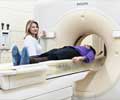CT scans deliver much larger radiation doses to the organs than conventional X-rays. The effective dose delivered during a full-body CT scan is
CT scans deliver much larger radiation doses to the organs than conventional X-rays. The effective dose delivered during a full-body CT scan is nearly 100 times that of a typical mammogram. A new study shows the risk of cancer death from a single full-body CT scan is just slightly less than the cancer death risk of atomic bomb survivors from Hiroshima and Nagasaki in Japan.
The study also shows elective annual scans carry much higher risks. Based on anecdotal evidence, the scans are performed on asymptomatic people to identify a variety of diseases, such as colon and lung cancer and coronary artery disease. A 45-year-old person who had one full-body CT scan would have an estimated .08-percent lifetime cancer death risk. This percentage would produce cancer in one in 1,200 people. However, a person of the same age who has annual full-body CT scans for 30 years would accrue a lifetime risk of about 1.9 percent, or nearly one in 50.Researchers say the risk can be reduced by increasing time between scans or by starting at a later age. They add different CT scans produce different doses and, thus, different risks.











